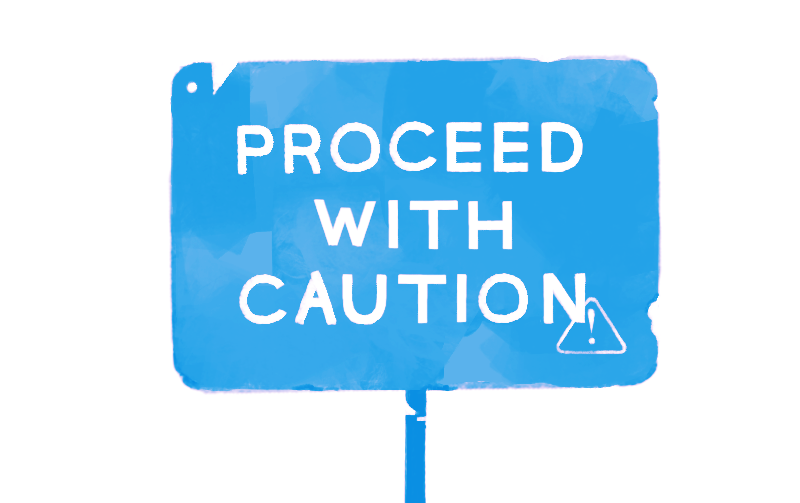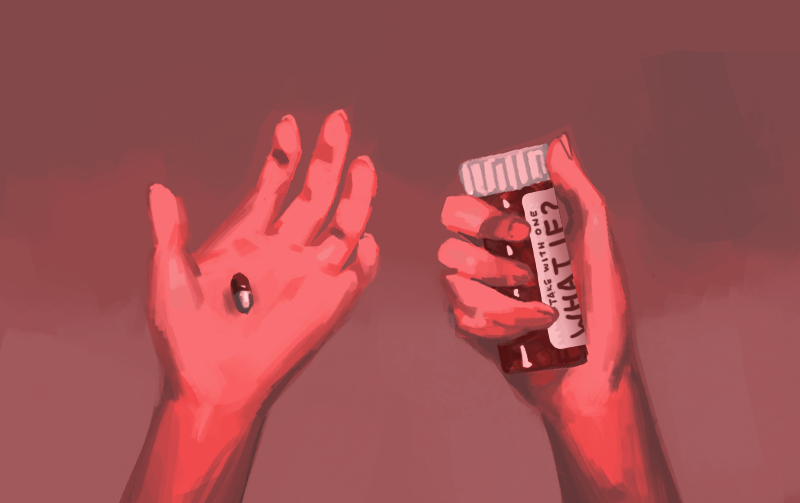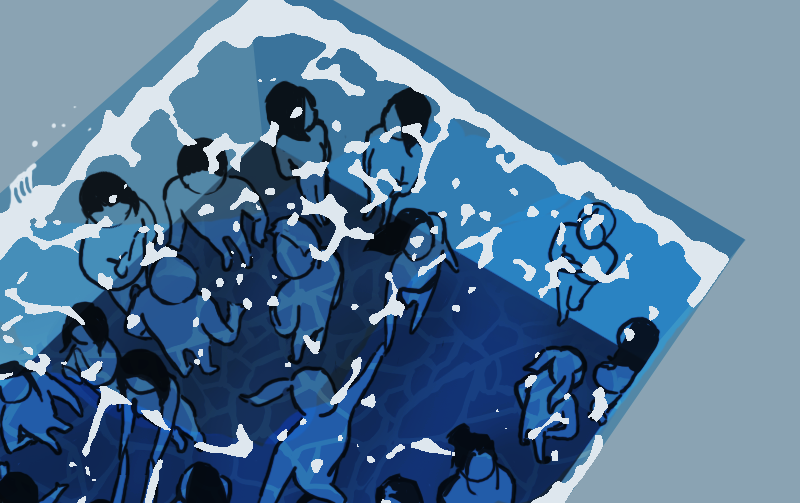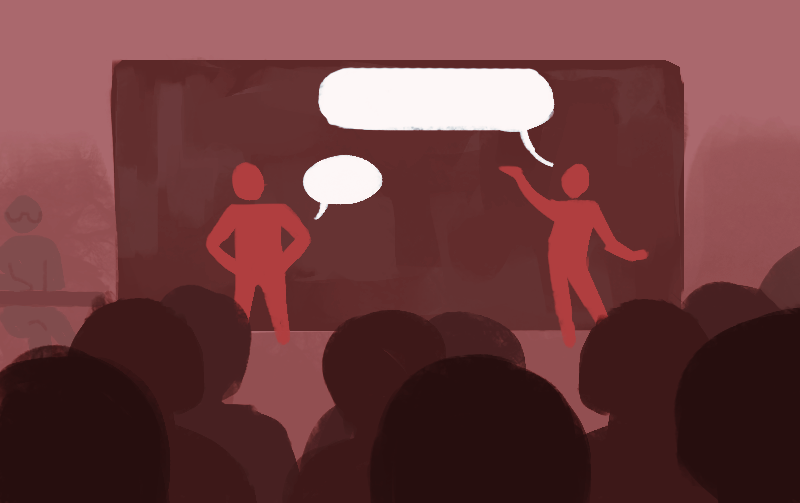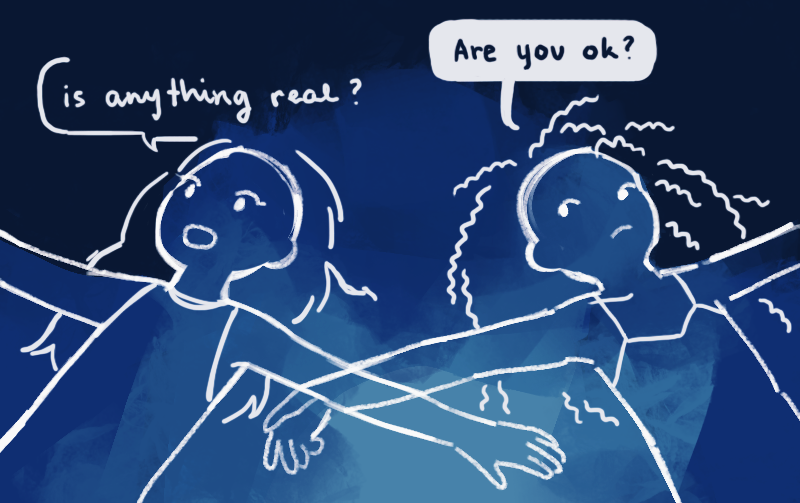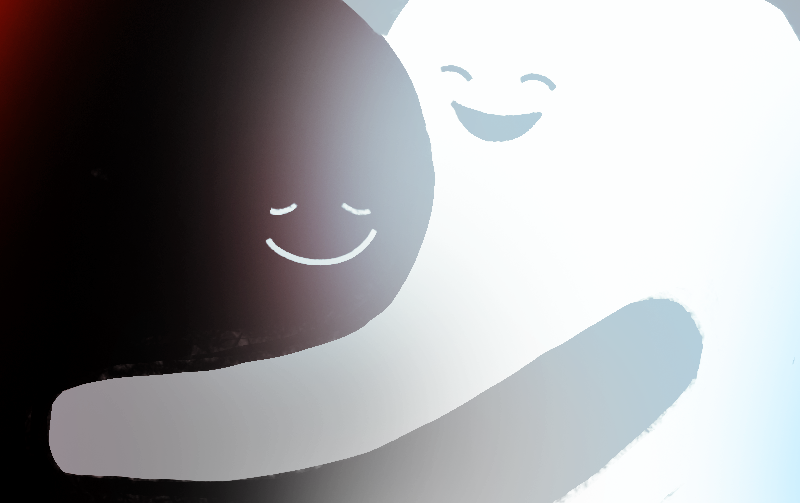For a lot of people, the line between red and blue is a bit fuzzier in real life than it is on Twitter. For me, this is true even though I’m firmly on the side of le resistance. I think it’s because there are some threads woven into my own biography that keep tying the two sides together, in spite of all the enmity. Maybe, I just have an odd intellectual history, but I wonder if others share something like the story I’m about to tell. I hope it’s not a story that ends up in one of those both-sides, can’t-we-get-along, dead-end morality clause cul-de-sacs. I hope my thinking isn’t as lazy as that. But the threads the story traces are definitely the common ones, and I’m going to take the risk of equivocation in order to follow the story to a conclusion that’s a little more complicated (and a lot less satisfying) than “blue is right, red is wrong.”
Now, by “red” and “blue” I’m mostly talking about political attitudes, not political parties. Suffice it to say that one of our two parties has lately been having a really bad attitude. If we’re talking elections, you can forget all these subtleties: blue is definitely right. Trumpus delenda est. But here I’m talking ways of thinking, not ways of voting. Outside the either/or of the ballot box, complexity has its pride of place.
I’ve broken this up into four sections. Here are the main ideas:
First, sometimes the line between red and blue isn’t just fuzzy: it can get scarily thin. Red can morph into blue and back again before you can say “heretic!” If this can happen, they must have something in common, and what they have in common is intellectual arrogance.
Second, the antidote to intellectual arrogance is intellectual humility, and the special relationship that humility makes possible is called “friendship.”
Third, humility takes practice, and we’re out of practice. We’re not sure what friendship means anymore, because it’s hard to understand it if you’ve never experienced it, and it’s easy to confuse friendship with two other kinds of relationship that seem like friendship but definitely aren’t. One is “fellowship,” which is more of a red idea, and the other is “community,” which is more of a blue idea. Red fellowship and blue community are false alternatives to each other, and friendship is a true alternative to both.
Fourth, our politics comes partly from the fact that we’ve forgotten how to be friends. At the same time, our politics makes it hard to remember what friendship is like — not least because there are plenty of people with whom friendship is impossible, and a lot of those people are currently in charge. But this means friendship might be a luxury we can’t currently afford if we want to stop the unfriendly beasts from wreaking their sorry havoc. It’s hard to fight “The Man” without keeping things simple and certain: us and them, right and wrong, good and evil. Maybe there’s a way to fight with humility; but then again, maybe we don’t have time to figure that out. So it’s a very bad situation.
I told you this might not be very satisfying.
Onward!
1. What If!? Red pills, Blue Pills, Moldbugs, and Xenomorphs
On the inside cover of my copy of The New Science of Politics, there’s a note from my younger self. As a college sophomore, I’d scrawled: This is the blue pill. It’s written in blue ink and punctuated with a period, to give it a sophomore’s sense of finality. At the time, my friends and I were taking Introduction to Political Theory with Dr. Van Street and we’d all been enraptured by Eric Voegelin, the author of New Science. Or maybe only I was enraptured and I remember the others that way because I like the image of camaraderie in pursuit of truth. But there was camaraderie, I believe, the real thing and not just in my mind. We’d found a little platoon. And we really were in pursuit of something.
Of course, my inscription should read “the red pill,” but either I wrote down the wrong color, or Dr. Van Street messed up his reference to The Matrix, which he used to frame New Science and to raise our expectations to more pedagogically useful heights. It wouldn’t matter, except that “red pill” is now a verb used by web-grown neo-nazis to enliven their little influence campaign. To “redpill” someone is to break through their moral illusions (which are protected by the blue pill) and convert them to the grittier truths of white supremacy. Taking the red pill is like “getting woke,” except that “woke” is for social justice Tumblrs, who rightly prefer the pleasures of hating nazis to the pleasures of being Nazis.
Eric Voegelin can be vaguely connected, by some very long threads of imagination, to the so-called alt-right. Voegelin was one of those emigre philosophers who personally encountered the 20th century’s right-left horrors, fled Europe for America, and devoted himself to the recovery of old insights the loss of which had in his view cleared the ground for the revolutionary nihilism of Hitler and Stalin. Among political theorists, he’s counted as a “conservative” because he wanted to recover a tradition, (the “new science” of politics was the target of his critique, not the name of his proposal), and this tradition is generally Western and specifically Greek. I know that a conservative respect for tradition can deform into racialized obsessions with “heritage,” and that an intellectual project of recovery can become a political project that aims to “take our country back” and restore the golden age. But in Voegelin’s case, this appropriation should be impossible, because the tradition he sought to recover was a practice of contempt for just this sort of hubris. For him, there is no lost golden age to be recovered by revolutionaries on the right, and there’s no future utopia to be organized by revolutionaries on the left. There’s only the real ruin that comes from our fantasies of purity and perfection, real goods and values destroyed, real chances for progress sacrificed to the elder gods or god-free “science.” So he believed.
Still, some redpilled dandies from our online alt-right clown schools do try to enlist schools of thought that make “tradition” a central concept, even when the tradition is basically liberal and protective of all the rights and institutions that stand in the dandies’ way. Things can get confusing. The other day I followed a link to a respectably conservative magazine posted by a respectably conservative acquaintance, who is, like me, a professor of political philosophy at a respectable Christian college. I’m not talking about Trump conservatives or Republican conservatives or neo-liberal conservatives or fiscal conservatives or Falwell Christians. They’re not especially fond of capitalism and they despise Fox News. We’re talking about some quirky people who believe in institutions, tend to prefer high culture to pop culture, appreciate religion, and have special sensitivities to the things that get lost in the rush to make “progress,” like small towns and local cultures and natural landscapes. Sometimes they’re called “crunchy conservatives.” If you’ve ever read Wendell Berry you’ll get a sense for their style of thought, and any decent leftist can read Wendell Berry with a thrill of recognition.
Anyway, I followed this link to the magazine and read the article and followed another link from there, and so on and so forth, until I found myself reading a blog about the discontinued blog of someone calling himself Mencius Moldbug. (I know Mencius, and you’re no Mencius, moldbug!) The moldbug is a computer scientist with a real name which I won’t repeat, because he doesn’t deserve to have a real name, having sold it at some point for a mess of pottage. It seems he has a following of “neoreactionaries,” who reject democracy and any sort of egalitarian politics and call for a Man to take control (literally). I read several pieces about these neo-reactionaries, including a very good one in The Atlantic, and found them described as the hidden intellectuals of the more visible alt-right. These are literal political philosophers, in other words. Not content with thinking philosophically about politics (which is what I try to do for a living), they think “philosophically” for politics. They want their thoughts to fuel a movement.
Real conservatives are always suspicious of movements. My beloved Berry has a whole essay titled “In Distrust of Movements,” despite Berry’s writings having moved many people to care for the land and fight corporate greed. This is a tension that real conservatives live with. The moldbug and his ilk, who were somehow connected to my ilk, had dispensed with tension altogether. (Aside: I like to think I don’t have an ilk. I have lots of ilks, which is really the only way to manage ilks. Ilks of the world, unite!) Maybe that was enough to set them apart as the bad guys, despite their resemblance to the good guys. But it was scary stuff. They were very bad guys. According to The Atlantic story, the moldbug once posted a piece of brazen equivocation titled “What’s so bad about the Nazis?”
Eventually, I had to let the white rabbit run on without me. I looked away and felt all the discomfort as well as the excitement that had accrued from seeing little pieces of my mind in this dark mirror. Discomfort, for the obvious reasons; excitement, because of the discovery. For a person who works with ideas, it’s always fun to trace connections and unravel threads, even when the connections may have not been found but simply made up. I’d found others making up connections between ideas that attracted me and ideas that repulsed me, and I was fascinated to find the line between those ideas to be so much thinner in their world than it was in mine.
I comforted myself with everything I said above, with my knowledge of the texts themselves, which seemed more than capable of holding the line. The barbarians were at the gates but the gates were solid; they would stand. Then I considered that everything solid melts into air and that this might hold even for those arguments I cherished as guardians of the true, the good, and the beautiful. I thought: What if? The question was not what if the moldbug was right, but rather what if I’d given comfort and aid to his lies, by respecting the books that he used to make his lies respectable, by making those books respectable with my respect, and by transferring the whole complex of positive association to his account, even if the exchange was unintended and untraceable and in the end just a drop in the bucket of the zeitgeist? And then more: what if the authors of these books, or at least some of them, actually were sympathetic to the moldbug’s perspective, and I had simply failed to find those sympathies in their books, because I’d made them out as heroes, and heroes by definition cannot be villains? This wouldn’t be impossible. Heidegger really was a Nazi.
What if? are the words that make the red pill glow. And I felt a bit redpilled by my trip into the dregs, even if the effect wasn’t what the moldbug would have wanted. The moldbug remained the constant: whatever was right, it could never be that, and if my Voegelins and Taylors and Strausses and Oakshotts and Alasdair MacIntyres were anything like that, then they were that much less right. So maybe I’d been wrong about some things.
I talked about the moldbug with my friend Paul. Paul is political philosopher whose formation has been similar to mine. We like “tradition” and we dislike fascists and Maoists who abuse and destroy it, and we like to find fascists and Maoists hiding in unlikely places, like college campuses and hashtag campaigns. Paul is writing a book about totalitarianism. He thinks totalitarianism is a parasite that takes the form of whatever host it settles in (actually he calls it a “xenomorph,” from Alien, which is clever). He says the totalitarian attitude is content disguised by form, and the form can be innocent. Not just innocent, but even inimical to what’s growing inside. Totalitarianism can spread through the brains of people who think they’re fighting totalitarianism. This is a fine metaphor but it didn’t exactly soothe my discomfort unless a clearer view of cold reality can comfort us. And if it does bring comfort, is it really a clearer view? Or is comfort a reliable sign that something’s gone wrong in our pursuit of truth?
The blue pill is the comforting one. It calms the “what if” with “who cares.” Who cares if the steak is real, as long as it’s delicious? Maybe Voegelin really was the blue pill, masquerading as red, and my inscription got it right. It felt like an invitation to seek the truth, there in Political Theory class, but invitations to exclusive events can feel very satisfying. Of course, truth always parades as an open invitation, but the event of seeking it is organized around the assumption that most people can’t or won’t attend. It feels good to be among that small group that gathers in the salon, to be one of those who can be bothered to care.
2. Seeking a Friend for the End of the World
Voegelin’s root of all evil was “Gnosticism.” The Gnostics were a mystic sect, a secret society, and later a Christian heresy of the crumbling imperium, when everything solid really was melting down, including the empire’s wild mix of deities and theories. Voegelin found Gnosticism in the letters of St. Paul, of all places, and traced its rot into the 20th century, where fundamentalism and scientism mistook themselves for opposites. Both, he suggests, are gnostic departures from Western tradition, because both demand what humans can’t have, which is certainty. Certainty about the true, the good, and the beautiful isn’t available to us, even if truth, goodness, and beauty are. Gnostics pretend and sincerely believe that certainty can be had, and they say that “Truth is a Secret,” into which the few can be initiated (what if?). But then those knowing few can form a vanguard and, liberated from doubts about what heaven is like, they can bring heaven down earth, and make earth the paradise they discover in their scriptures or (more recently) in the deliverances of their data (especially if the data is Big). St. Paul was a Gnostic, not because he had a vision of the eschaton, but because he tried to come back with it, and build a church around it. People like Plato also had visions, but they kept their modesty. Possessed of moral clarity, they bound themselves against the lure of certainty, that siren ship-wrecker. Plato never tried to “immanentize the eschaton.”
That was Voegelin’s phrase, and we took to it, our little platoon of college friends. We felt we’d earned it, come by it honestly, since it hadn’t been easy to grasp, or even to pronounce. We’d bring it into our conversations, not too pretentiously (we knew it was ridiculous) but without being completely ironic. For a joke (but also as an argument) we’d use it to label the mistakes of other thinkers and especially of those spaced-out theology majors, who we supposed had been corrupted by their guru professor. “Stop trying to immanentize the eschaton,” we’d say. It was harmless, even wholesome. We were stretching new muscles, as one does.
We should all take such joy in our discoveries, and in the friendships, we make while making them. And I think that what I’d actually discovered wasn’t an inside joke or a name to drop. What I’d found in that class, where we read not only Voegelin but also Plato, Augustine, Dante, Marx, and the Epic of Gilgamesh, was not the one right answer to a question that everyone had. It was the possibility that the answers others had given to my own questions might be wrong. More to the point, it was the possibility that I myself could be wrong about things. Big things, even.
There were things I’d always assumed it was impossible for me to get wrong, not because I imagined I was too smart to make mistakes, but because I’d thought these weren’t the kinds of things about which anyone could be mistaken. They were truths that people could deny, but the denials could never be honest because the truths were self-evident. And I was above all honest, committed to telling the truth. Of course, my own arrogance was also in the mix, and I tended to think that I was indeed too smart to make mistakes about the big things, the big truths about life, the universe, and everything, like politics and religion. And Voegelin also made my arrogance plainer to me. But those character flaws were never just my own. They’d been fused with a fantastic apparatus, which disguised arrogance, incredibly, as humility. Call this apparatus a “culture” or an “ideology” or whatever; it’s a whole pattern of thought and it’s like the water the fish inhabits, unaware that this is water, as DFW put it.
As a freshman, the semester before I took political theory, I was in Dr. Loving’s course on biblical literature. The suggestion that the Bible could be literature put me on my guard, which I enjoyed, spoiling for the fun of an argument. We spent some time on the book of Revelations, and all of Pastor Conway’s Sunday night fantasias came back to me from my fundamentalist boyhood at the Mt. Zion Baptist Church, along with later, less fervid but still serious expositions of end time events and their speculated correspondences with real-world affairs (Gog and Magog matched up with Russia; Armageddon located on current maps of the Middle East). Good taste had saved me from the Left Behind series, but those books were in the air at the time, and if I knew they were trash as literature, I’d thought less about the way of reading that allowed for their writing and made them popular, because that way of reading was like water to me. Yet I’d started to notice its existence, flickering. Over at the campus church Pastor Brown was making it an issue and offering another way. Revelations, he said, was not a prophecy about future events to be taken literally — although to be sure the LaHayes and Jenkins didn’t literally take Revelations literally. For them, the Beast wasn’t literally a beast (since that would be ridiculous) but a man. But there was a literal Man, yet to be born (or born already! what if?). In their way of reading, there are metaphors, but the metaphors must encode facts, and the reader’s job is to decipher the symbols and calculate the numbers so we can know and prepare for what’s next. What the reader gets from this exercise is proprietary information. To possess it is to anticipate the coming day of told-you-so when we will count ourselves among the Unsurprised.
Pastor Brown said no — Revelations was actually a mystic’s assault on Rome. It wasn’t about the reader’s future, it was about the writer’s present. That’s what “eschatology” actually is. What the reader gets is whatever wisdom we can glean from considering John’s circumstances and the moral clarity he brought to them. The empire was violent, oppressive, arrogant, a cesspool in which the lowly got drowned for the profit of the rich. The empire was the beast and the false prophet and its spirit was the antichrist. Its gods were idols demanding blood, and this holds especially true for the god-addled emperor. At least the actions of the pagan gods could be excused by the fact that they were not real. By contrast, the emperor was a very real human being who pretended to be more and used the pretense to excuse sensational cruelty. John used his dreams of angels and pits to preach truth, not to record facts. And maybe that truth was also true of the reader’s present age? Perhaps even true of the reader herself? So suggested Pastor Brown.
I write as if he literally said these things, but I’m sure I’ve filled in some gaps with my later reflections. What I do remember is that his sermons struck like flint against the older etchings of Pastor Conway, and I retreated from the spark into a posture of defense, although it didn’t feel defensive. It felt like a chance to debate, which was a chance to display my powers, and to take joy in their display. Pastor Brown was too distant for that, but Dr. Loving’s class gave me the chance, by way of an assignment. We were to engage with a prompt about the distinction between “soteriological” truth and “epistemic” truth. These are theologian’s terms that capture different ways of believing that scripture, or specific parts of it, are true. Some people think the bible tells the moral truth about the human condition, about the way to salvation (“soteriology” is the study of salvation). The moral truth might be told with metaphors, analogies, and stories; scripture can be read as a “true myth.” So it doesn’t matter if it gets all the historical and scientific facts right, including (and especially) facts about the future. Others think that if scripture doesn’t get all the historical and scientific facts right, then there’s no warrant to trust whatever moral truth it claims to tell. It’s got to be true “epistemically” if it’s going to be true soteriologically. We’ve got to have certainty before we can have clarity.
I used the question about Revelations to set up my argument and savaged Pastor Brown’s approach with what I’m sure was my usual strident glee. It felt heroic to press the case for rock-ribbed plain-speaking epistemic truth against the too-clever distinctions of these new-fangled authorities. I would hold the pass to Mt. Zion, with nothing but logic.
A few days after I turned in the essay, just before the semester’s end, I found in my mailbox three handwritten pages from Dr. Loving, probing every nook and cranny of my argument. Oh! the time it must have taken him to take me so seriously; the humble condescension; the creation of an occasion for someone else to rise, out of nothing but the evidence that the person was unworthy of being raised up. I don’t mean to indulge in false modesty. I’m sure he “saw something” in me, in my intellect. But what had I shown him of my soul? Just the predictable arrogance of youth, preening itself on Submission to Truth. Yet he let it pass unnoticed, focused on the substance of what I had done (the words I’d chosen, the argument I’d constructed) while pointedly ignoring the image I’d wanted my performance to conjure (of myself, brilliant and invulnerable). And, having gone unnoticed for just a moment, that self-image briefly relaxed its grip. For maybe the first time, I felt rushing into the vacated space that crucial, adult-making mix of conflicting emotions: the feeling of being respected, and the feeling of being shamed. The mixture lingered and shaped me.
I remember now that the year before this I’d been a senior at our Christian high school. At some point during bible class, our teacher wanted to illustrate his point with a vignette. He asked my friend and me to perform it. The scene was a classroom at a secular college; I played an unbelieving professor of philosophy, and my friend played a Christian undergraduate. The plot was a debate between them about the problem of evil, which I was to lose and she was to win, by citing Augustine and making an analogy about dark being nothing but the absence of light. The haughty wisdom of this world shown up by the earnest first year with her bible in hand. Having since become an actual professor of philosophy, and having read my Nietzsche, I look back now and see little more than ressentiment — Christians throwing heretics to lions, now that the empire is converted. What lesson did that bible teacher make for his students from our vignette? That what mattered in debate was to win, because the truth was at stake. Now Dr. Loving had taught me a better lesson: that the pursuit of truth is different from the fight for victory, and that truth is usually won by losing, even if we can only lose properly when we do our best to win.
I recently got around to reading the Confessions, and found Augustine to be more ambivalent than my teacher’s caricature supposed. Many modern Christians would not survive a conversation with the Bishop of Hippo:
When I listen to a Christian brother who doesn’t know about natural philosophy and gets something wrong, I look on him and his views with forbearance, as long as he doesn’t believe anything inappropriate about you, Master, the creator of everything. I don’t consider it a problem if by chance he lacks knowledge about the distribution and disposition of an object in your creation. It is a problem, however, if he thinks what he says belongs to the essential structure of religious instruction, or if he obstinately and audaciously asserts something about which he knows nothing.
Augustine brooks no propaganda and permits no self-deceit. The Manichees are exposed as charlatans, and he himself is exposed as a fool who’d been easily swayed by their sophistic tricks and heady speculations about cosmic battles of light and dark. He stares unblinking at his vices and doubts, exhibiting powers of introspection unavailable to most philosophy professors, let alone to smug first years who dress up their paltry libido dominandi in the costume of righteous indignations delivered like clockwork when their buttons are pushed by any affront to the Absolute, or who (far more commonly) cloak that lust for power in the absolute relativism which now passes for moral seriousness.
Yet Augustine is maddening in his own sureties, and he would later kill his fair share of heretics, as the church took over for the dying state. He says: “I’ve become a puzzle in my own eyes, and that puzzle itself is my sickness.” But it makes every difference whether we think the cure is to solve the puzzle (so we can stop puzzling), or to stop seeking the cure in a solution (if the seeking itself is the sickness). Augustine goes back and forth, sometimes achieving the most heart-stopping extremes of what Keats called “negative capability,” before veering away to that precarious serenity of a True Believer, who is incapable of suspending his raptures long enough to enjoy simple pleasures without any virtue-signaling guilt.
3. Red Fellowships, Blue Communities
Against these kinds of whiplash epiphanies and hunts for the theory that would perfectly reconcile them, I was starting to range experiences that struck me as more to the point of life. Or let me put like this, and more precisely: I was starting to distinguish the whole of these experiences from some of their parts, which might well involve hunts for new theories and real moments of insight. In political theory class, there were the books we read and the arguments we made, but there was also the “we” being forged by the reading and the arguing. This “we” was something other than what is commonly called “fellowship” in the evangelical churches of my youth, where we have halls labeled for the purpose (in which we eat terrible food and declare it good), and generally take for granted what is called “community” by those outsiders who (correctly) fear that something like community has been lost in our modern world and must be rebuilt according to a Plan, which tends to involve clearly labeled and studiously secular “community building” programs.
“Fellowship” and “community” are the off-kilter relations of friendship. Friends can hunt for theories together, and share insights with one another. They can even hunt for theories of friendship and insights about friendship, which can sharpen and inspire. But their friendship isn’t something to be certified by the theory. If it is, then it’s not friendship, and it’s a very bad theory. Nor can friendship be unraveled by a theory’s failure to explain or justify it. It’s common for young people, and not just those inclined to philosophy, to at some point get wrapped up in late-night solipsism (“how do I know that other people exist? maybe they’re all just figments of my imagination!”). Real friends will be unruffled by such questions, even if (precisely because) they can spend a pleasant hour in considering them, and in coming to competing conclusions. The hunt is the thing; but the hunt becomes a different thing when we forget, while we are hunting, that the thing is to hunt, and not to eliminate the need to go hunting, along with the pleasure that hunting brings.
The church fellowship hall doesn’t promote this sort of relationship. The hall is usually a separate room but really it’s just another sanctuary, and the point of the sanctuary is to exclude conversations that would upset the agreements on which people have wrongly staked the possibility of friendship itself. Many leave the church because they get stifled by its fellowship. And then, sometimes, they take up an attack position outside the sanctuary walls, from which they lob accusations and provocations and tell truths with vindictive grins.
These exiles still don’t understand friendship, because they still have no sense for how to handle disagreements with good cheer and in good faith, which is the nature of friendship itself. And how would they have developed this sensibility, having never been given the chance to practice disagreeing together? Their church failed to teach them the art of conversation, and actively discouraged its cultivation. Conversation in their churches excluded disagreement for the sake of harmony, even though the conversation is rightly understood as the practice of harmonious disagreement. Lacking the experience of anything different, it’s no surprise that many who leave the “conversation” continue to hate real conversation just as much as the targets of their rebellion. And it’s not like there are many other places in our culture where they might acquire this experience after leaving their church. In fact, there are fewer and fewer places, as more and more of our culture moves online, where most of the bridges are guarded by trolls.
Some of the exiles from our churches are drawn to the so-called “cultural Marxism” of our college campuses, and no wonder: there’s no practical difference between the moralism of the politically correct and the moralism which is politically incorrect. The same dry cake is served and had on both sides. For people who don’t know how to eat cake, and what cake should taste like, the transition is natural. It’s unfortunate that the college campus should be so receptive to that adolescent frame of mind which preserves the world in its black-and-white skein simply by reversing what is designated black and what is designated white. One place where we definitely should get the chance to learn how to enjoy our disagreements is a liberal arts college, and that’s the joy I was learning in political theory class. It’s what I’d already started to learn the previous semester, in Dr. Loving’s bible class; and it’s what I was practicing in the dorms at night, staying up till all hours defending Calvinist doctrines of sanctification against the Armenian heresies of my mostly Wesleyan compatriots, when we were not playing Bond (which I always lost).
Our questions were pointless, or so they seem to me now. Angels on pinheads. But far from pointless was the questioning, and the concurrent relaxing of our need to know. Of course, that was happening behind our backs, while we were trying hard to win the day before we went to sleep, and forgot all about it. Such things do occur at confessional colleges, even evangelical ones, where there are always factions mobilizing to stamp out the conversation in order to preserve fellowship. (That theology professor, the guru who’d corrupted the youth, was soon enough forced out by the trustees and replaced by some ho-hum doctrinarian). Such things can still occur even at secular colleges, where no one confesses to anything because it would be intolerant. But friendship is getting rarer in both environments, soon to be fully replaced by the friending of social media, which prizes fellowship (though the tech gods call it “community,”), and monetizes the enmity of rival sanctuaries.
As it gets more socially mediated, the confession of doctrine gets louder in the red-state church and its cultural apparatus, where the congregation bridles with understandable confusion at the contempt for confession shown by all those distant patches of urban blue, where the residents are loudly confessing their own more enlightened doctrines. And the blues look with justifiable dismay at the closing of red ranks and red minds to outsiders, at the phobias disguised by principles and the principles forgotten in pursuit of power. The blues rightly worry about fraying social bonds in the flyover country, leaving millions vulnerable to screamers and strongmen who promise to restore what the blues do agree has been lost (“fellowship”), but which they (as blues) want to replace with the much bluer “community.” In the fellowship we have to agree on the substance in order to be friends; in the community, all we apparently need to share is a vaguely positive feeling about whatever “community” is.
When it is not just the name for a collection of people who share the same job (“the law enforcement community”) or the same identity (“the LGBTQ community”), community in the blue mind is built by intensifying those positive feelings, and this is often accomplished by talking very earnestly about our negative feelings, preferably with the guidance of a trained professional. Here is confessional culture in a different sense. Instead of professing our allegiance to some abstract description of the human condition, we confess our embarrassments and vulnerabilities to one another. Then we praise one another for being “brave,” and “community” is the fully intended product of this society for mutual admiration.
The red mind likes to mock these touchy-feelies and to hold up in contrasting light the heroes of old, the taciturn John Waynes and the uncomplaining soldiers and Rosie-riveters of the Greatest Generation. But the red mind has its blue moods, and not just because it’s been infected by the therapeutic culture of the coasts. The evangelical and even the sterner fundamentalist heart also strives to concoct community from the public confession of weakness. At my very evangelical college, there were the classrooms where we could become friends because we were thinking together about something other than ourselves, with teachers like Van Street and Loving. But there were also those other rooms where all were invited to share prayer requests, with which we fished for sympathy and for the confirmation that our lives were interesting. Often our teachers and pastors would push us to dig deeper, to make ourselves fully known to one another, by confessing our very unique insecurities (“I seem confident on the outside, but inside I really care a lot about what people think of me!”), our sexual indiscretions (in suitably censored language) or even our forbidden sexual orientations (allowing the properly oriented to make a fine show of forgiveness).
All of these confession sessions confirm for each participant that no one in the group is better than him, which may not actually be true, but supports the sensation that community exists, because community has been defined as an emotional goal, to be achieved by sheer sincerity, rather than as the emotional byproduct of friendship, which is the fruit of doing something that aims at something besides the emotion, something which can be done well or poorly. It’s all extremely American, not terribly Christian, and definitely not conservative if my beloved theorists of tradition are conservatives. Only small children will seriously ask each other “do you want to be my friend?” But full-grown adults, red and blue, will sit around getting intentional about building community.
4. The Recovery of Friendship
I think we need to recover something, here in this political moment, if we’re going to send our moldbugs back to their holes in the walls, before they can achieve their stupid dreams. I’m calling this something “friendship,” and I’ve tried to give the sense of it, but I wonder how many people still know enough about what I’m talking about to distinguish it from its more easily described counterfeits.
These are some conservative sentiments (since I want to recover something), but don’t mistake me for that kind of conservative. The fellowships of old, the unanimous ideological choruses and color-lined neighborhoods and boys’ clubs, for which too many “conservatives” now pine, confusing nostalgia with insight, were not the locales of friendship. And make no mistake, you plutocrats and enablers of plutocrats: the possibility of friendship depends on material conditions which should be our common and public concern. Citizens should use governments to restore, create, and sustain these conditions. And those are some liberal or even socialist sentiments: but let no liberal mistake me for that silicon progressive who conflates progress with improving statistics, and trades in corporate clichés about diversity. The communities celebrated by blue-mood liberals are too often celebrated just for being communities, as if it doesn’t matter what the community is formed around, so long as the feeling of community is sustained. That’s flirting with the xenomorph. If the reds and moldbugs by contrast insist that it matters very much what forms the community (the Truth, Heritage, or whatever grand Capital Noun you want to pick), they betray their deeper indifference to the substance by their obvious distaste for friendship, since only friends can persuasively ask each other the sorts of substantive questions that challenge Truth and complicate Heritage. What the moldbugs really want is just what the community-mongers are selling: the feeling of belonging. But real friends do not need belonging; they have each other.
Is there a politics of friendship? A democratic politics of happy warriors contesting with one another, people whose deep convictions do not require them to conflate epistemic certainty with the moral clarity that saves us from hubris, and from all the cruelties that the proud and fearful must inflict on themselves and on their enemies, in order to sustain their shared illusions of knowledge or their supply of empty fellow-feeling? Or is friendship a dangerous retreat from politics, which in the end can only be fellowship, or conflicts between fellowships, or withdrawals from fellowships into communities, which harden into new fellowships, which compete with older and other fellowships, and so on and so forth, in timeless cycles of history that makes no progress, where no golden age can ever be other than gilded?
I say we must recover friendship in order to address ourselves to our politics. But I don’t really have an answer to the question I just posed. I don’t know if the recovery of friendship, and the creation of contexts where friendship is possible, would represent an escape, a withdrawal into the convent while we wait out the new dark age of warring states; or if it would indicate a strategy and a solution, a redoubling of faith in our institutions that might save them from ourselves. I honestly don’t know. I know there are moral limits to political friendship: you can’t be friends with a moldbug. But I also know I’ve got some excellent friends, non-moldbugs every one them, and that it will be a fine thing to discuss the question together, over a cup of coffee or a glass of bourbon. We might reminisce a bit about that class we took together, back when we still believed in Truth, before we learned the truth. •
Images illustrated by Barbara Chernyavsky.





